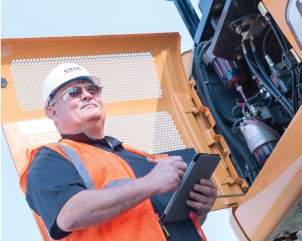How to Recognize the Early Signs of Hydraulic Equipment Failure
When it comes to your heavy equipment, maintaining the hydraulic system is extremely important. These components are what ultimately give your machines the ability to move, lift, dig, dump, and power attachments. If they aren’t well cared for, then hydraulic systems will fail, leading to very expensive repairs and significant downtime. By knowing the signs of impending issues, you can recognize problems before they escalate and cause work disruptions. In this article, we cover key indications of hydraulic failure, so you can act to prevent it.
The questions that are answered include:
- What causes hydraulic failure?
- How can you locate hydraulic leaks?
- What are the top signs of hydraulic pump failure?
- What abnormal sounds should you listen for?
- Does slow operation indicate hydraulic issues?
- Is overheating a problem for hydraulic systems?
- What preventive maintenance is important for equipment hydraulics?
What leads to hydraulic failure?
The common culprit behind equipment hydraulic system issues and downtime are contaminated fluids and inconsistent or incorrect maintenance. Dirt, metal particles, and other contaminants will clog your valves, damage seals, and cause excessive wear and tear on pumps and hoses, eventually ending in leaks. Not keeping up on fluid changes and inspections can worsen the contamination, potentially causing significant, expensive delays.
How can you locate hydraulic leaks?
If your machine’s hydraulic system leaks, it can result in a decrease in pressure, power loss, and less efficient performance for digging, moving, and lifting. Early indications that you may have a leak include:
- Fluid pooling up under your equipment
- Hydraulic pressure loss
- Sluggish hydraulic pumps
- Unfamiliar sounds coming from the system
Routine inspections and proactive maintenance will help you notice leaks before they expand into bigger problems.
What are the top signs of hydraulic pump failure?
Hydraulic pump failure will bring your machine and your job to a halt. To prevent that situation from happening, we suggest looking for:
- Increased noise levels like whining or grinding
- Loss of pressure or large changes in pressure
- Increased heat buildup
- Metal particles in your hydraulic fluid, which means internal wear
Correct hydraulic pump maintenance, including fluid analysis and filter replacements, can help lengthen pump life and ensure smooth operation.
What abnormal sounds should you listen for?
Knocking, banging, or whining could point to issues within your hydraulic system. Common reasons for these noises are:
- Air contamination (aeration)
- Cavitation due to insufficient fluid supply
- Worn out bearings or misaligned components
Taking care of these problems quickly through hydraulic maintenance and routine inspections can help you avoid a catastrophic failure.
Does slow operation indicate hydraulic issues?
If your hydraulic equipment is running more sluggish than usual, it might signal a more serious problem. Potential reasons for slow operation include:
- Clogged filters restricting fluid flow
- Worn out seals or gaskets
- Insufficient fluid levels or contaminated fluid
Conducting hydraulic system maintenance regularly will make it easier to spot these types of problems before they get worse and ensure consistent, smooth machine movements.
Is overheating an issue for hydraulic systems?
If your machine’s hydraulic system becomes too hot, it can lead to fluid breakdown and serious component damage. The most common culprits behind overheating generally are:
- Low fluid levels that decrease cooling capabilities
- Contaminated or degraded fluid
- Excessive stress on the hydraulic pumps
Keeping a close eye on your system’s temperature and maintaining proper fluid levels is very important for avoiding overheating and expensive failures.
What preventive maintenance is important for equipment hydraulics?
Preventive hydraulic maintenance is critical for extending your machine’s service life. Follow these steps:
- Conduct regular fluid analysis and top offs
- Inspect hoses, seals, and fittings for wear before using the machine
- Replace filters according to the manufacturer’s recommendations
- Consistently keep tabs on system temperature and pressure levels
By implementing these maintenance best practices, you can assure optimal performance and a long service life for your hydraulic equipment.
FAQs
Q: When should you replace hydraulic fluid?
A: The interval can vary significantly depending working conditions, but a good rule of thumb is to change hydraulic fluid about every 2,000 hours.
Q: What is the most common reason for hydraulic pump failure?
A: Contaminated fluid is the top cause of pump problems, because it accelerates wear and tear and can damage internal components.
Q: Can air in a hydraulic system lead to breakdowns?
A: Yes, air can cause cavitation, pressure loss, and extra wear on components.
If you have any questions about maintaining your machine’s hydraulic system, then contact our team today!

